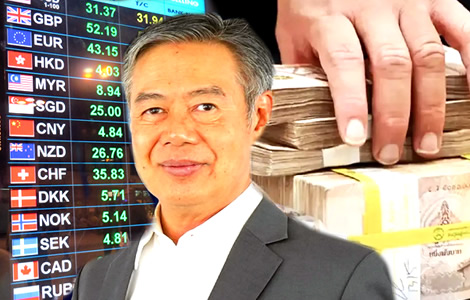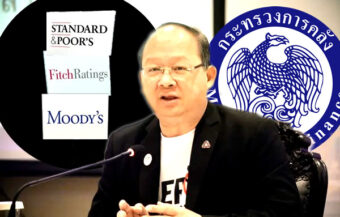The Thai baht’s mysterious rise is hammering exports and tourism, with economists baffled and regulators divided. Suspect gold flows, shadowy capital, and weak oversight are fuelling fears of a financial shock as the new government struggles to respond.
The surging Thai baht is wreaking havoc on the economy, dragging down an already fragile outlook for late 2025. It’s making Thailand more expensive for tourists and hitting exports hard, especially with U.S. tariffs already set at 19%. Even more alarming is that no one really knows why the baht is rising. Some blame a spike in gold exports, while others point to suspicious inflows, with the Bank of Thailand quietly recording ฿100 billion per quarter under the vague label of “errors and omissions.” In short, the baht is soaring—and policy makers are flying blind.

One of the most urgent issues facing the new Thai government, due to be sworn in on Wednesday, is the escalating strength of the baht. Since early 2025, the currency has appreciated nearly 8% against the US dollar. This makes it the strongest currency in Asia. However, this rise is not backed by solid fundamentals.
Thailand’s economic growth remains tepid. Inflation is subdued. Interest rates are low. None of these supports a stronger currency. Despite this, the baht keeps climbing. And disturbingly, the Bank of Thailand is unsure why.
Capital flows offer no clear explanation. Net bond inflows are being offset by net equity outflows. On paper, it should be a wash. Yet the baht keeps surging. Therefore, attention has shifted to the country’s gold exports.
Surge in Thai gold exports to Cambodia raises red flags over scams, fraud farms, and illicit activity
Thailand’s gold shipments jumped 69% between January and July, reaching ฿254 billion —around US$8 billion. Much of this gold is going to Cambodia, a country with a smaller economy. This has raised red flags.
Observers now suspect that these exports may be linked to illicit activity. Specifically, fraudulent call centre scams and online “fraud farms” operating inside Cambodia. Evidence suggests complicity from the Cambodian authorities. Some even claim that senior figures in Cambodia’s leadership have a direct stake.
The United States has already acted. It sanctioned income flows from these operations earlier this year. In response, Thailand has tried to regulate gold sales to Cambodia. However, gold traders have resisted proposed tax reforms.
Even with these efforts, massive amounts of capital continue to enter Thailand. According to economist Supavud Saicheua, at least ฿100 billion per quarter is flowing in. Yet strangely, this money is logged as “errors and omissions” in the Bank of Thailand’s balance of payments data.
Conflicting responses from Thai agencies deepen fears over capital flows marked as ‘errors and omissions’
This raises serious concerns. When billions are entering a country, and authorities can’t explain why, something is wrong. Saicheua has urged regulators to uncover the truth. Otherwise, the integrity of the financial system could be compromised.
So far, the Bank of Thailand has pushed back. It insists these inflows are not abnormal. According to Assistant Governor Chayawadee Chai-anant, errors and omissions do not directly impact the baht. She claims capital flows remain balanced. But the evidence suggests otherwise.
Meanwhile, the Finance Ministry is considering a new tax on online gold purchases settled in baht. The goal is to curb demand and slow the baht’s rise. Whether this will work is unclear. Critics argue that it does not address deeper structural issues.
Therefore, the real problem appears to be Thailand’s inability to manage cross-agency coordination. The National Economic and Social Development Council (NESDC) warns of hidden capital. The central bank denies it. The Finance Ministry floats taxation. Investors are left in the dark. And public confidence is fading.
New leadership fails to provide coherence as baht’s strength harms tourism, exports, and global appeal
This economic cacophony highlights a dangerous disconnect. With a new government, new Finance Minister, new central bank governor, and new NESDC head, expectations were high. Yet so far, all the public sees is confusion and delay.
The baht’s rapid ascent may seem like a win. But in reality, it threatens long-term competitiveness. Thai exports are becoming more expensive. This hurts industries already struggling with global demand.
Vietnam, for example, has become more attractive to investors and tourists alike. It offers cheaper production costs and more affordable travel. Meanwhile, Thailand’s strong baht deters spending and investment. If this trend continues, tourism and exports may both suffer.
Further analysis deepens the concern. Dr. Nonarit Pisolyabut of Thailand Development Research Institute (TDRI) believes these capital inflows are mysterious and unexplained. He outlines three main theories.
Economists warn of black, grey, and untaxed white money driving speculative inflows and currency risks
First, the money may originate from an underground economy. This includes illegal funds from scam operations, gambling, or online crime. Secondly, it could be untaxed legal money. For instance, proceeds from tax evasion or informal business activity.
Third, it may be what economists call “white money”—legal but opaque funds from overseas tax havens. In this case, foreign investors see the baht as stable, like the Swiss franc. They park money in baht-denominated assets to preserve value.
Over the past decade, the baht has steadily appreciated. This encourages speculative inflows. Yet the Bank of Thailand cannot track all of them. That’s a serious regulatory gap.
Furthermore, these inflows create artificial demand for baht. That raises the exchange rate. In turn, it reduces the competitiveness of Thai exports and raises domestic costs.
More worryingly, such capital might be used for money laundering. Some believe illicit profits are being channelled into gold, then converted into baht. Others point to the use of cryptocurrency as a laundering mechanism.
Inaction on capital controls risks making Thailand a hub for grey money with dangerous long-term effects
If true, this would mean that Thailand is becoming a hub for grey capital. Left unchecked, this could distort the economy. It could also trigger international scrutiny and reputational damage.
Black money must be urgently suppressed. That is non-negotiable. Meanwhile, grey money must be brought into the legal system. It must be taxed and regulated.
White money, though legal, poses its own risks. It is harder to control. But letting it flow unchecked could destabilise the financial system. Therefore, policymakers must act quickly and decisively. The longer they wait, the greater the danger. While the rich may enjoy a strong currency, workers and exporters will suffer.
Already, household debt in Thailand is alarmingly high. Liquidity is scarce. Large corporations are beginning to feel the pressure. Without fresh capital, many could face difficulties.
Some policymakers have floated the idea of quantitative easing. This would inject liquidity and weaken the baht. The previous Pheu Thai government supported it. The new government may revive the proposal. However, conservative elites are likely to resist it.
Deep financial caution rooted in 1997 crisis now clashes with today’s urgent need for liquidity and reform
They remember the 1997 Asian Financial Crisis. At that time, Thailand’s weak financial safeguards led to collapse. Since then, the Bank of Thailand has pursued a conservative monetary path. It has built strong external reserves and robust banking systems.
But times have changed. Today’s challenges are different. The threat now is not just external. It is internal as well. Rogue capital flows, policy incoherence, and weak regulation are the new danger zones.
Supavud Saicheua has been vocal on these issues. He is not just an academic. His career spans government, diplomacy, finance, and economic policy.
He once advised the Finance Minister, in addition to serving as Deputy Secretary-General to the Prime Minister. He also worked as an economic officer in Washington, D.C., negotiating Thai-US trade. His education includes degrees from top institutions in New Zealand, the Philippines, and the United States.
Former finance adviser warns that disunity and shadow capital flows could trigger the next Thai crisis
Therefore, when he raises concerns, they carry weight. He warns that without clarity and coordination, Thailand may face a new financial shock. This time, the threat comes not from Wall Street—but from the shadows of grey capital and bureaucratic confusion.
Top Thai banker launches blistering attack on present state of the economy calling for more inclusion
Top economist warns of a stronger baht as the US economy weakens. Tourism and exports face a severe hit
PM vows action on rising gold exports to Cambodia and the runaway Thai baht against the US dollar this year
To protect Thailand’s economy, urgent steps are needed. Agencies must collaborate. Regulations must be tightened. Transparency must be restored. And illicit flows must be shut down. In conclusion, the rise of the baht is not a sign of strength. It is a symptom of unresolved weaknesses. The economy is vulnerable. Policymakers are divided. And time is running out.
The new government has a rare opportunity. It can bring unity, clarity, and decisive action. Or it can repeat the mistakes of the past—this time with far greater costs. Thailand’s future depends on which path it chooses.
Join the Thai News forum, follow Thai Examiner on Facebook here
Receive all our stories as they come out on Telegram here
Follow Thai Examiner here
Further reading:
Rate cut anticipated as outgoing Bank of Thailand governor attends last Monetary Policy Committee
Last minute tweaks in Bangkok as deal is finalised with U.S. However, Thailand may not match Vietnam


















